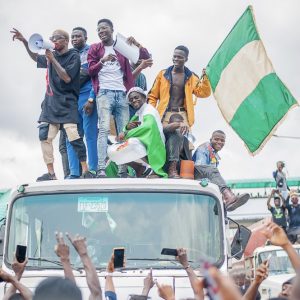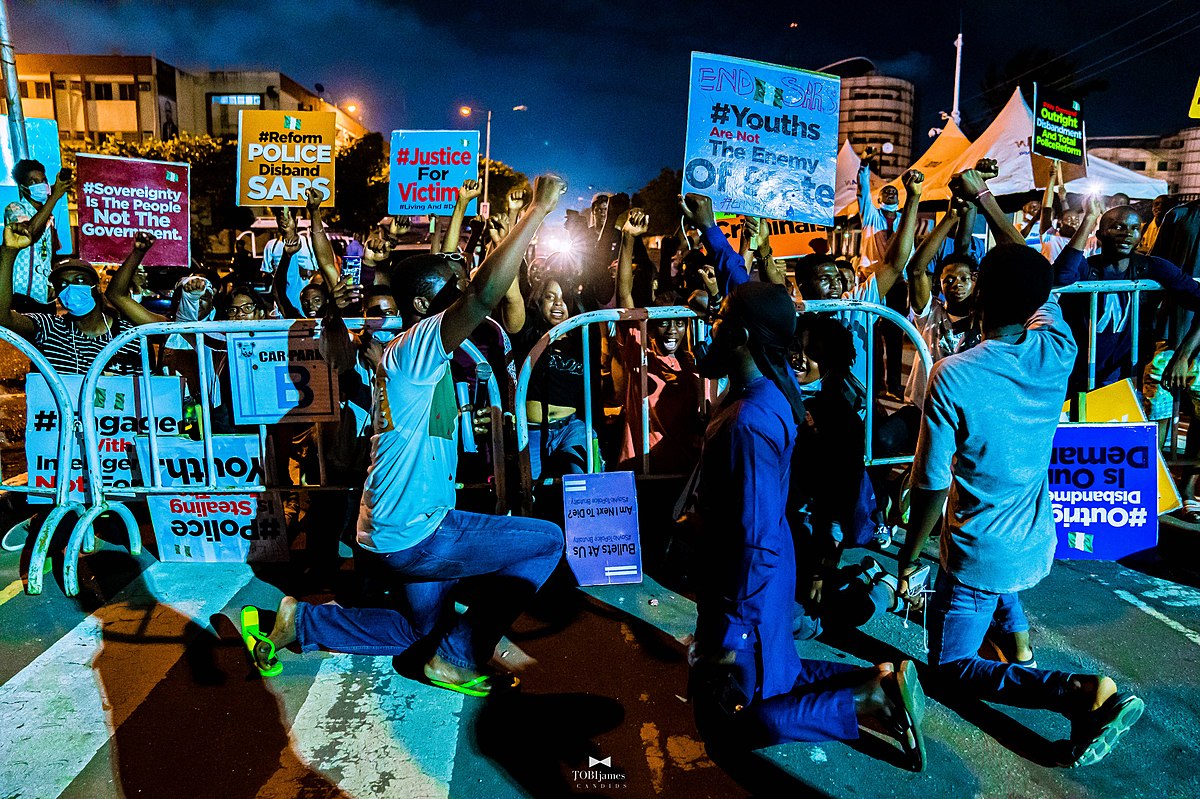[vc_row][vc_column][vc_column_text]

Recent protest in Nigeria. Credit: TobiJamesCandids/WikiCommons
A few weeks ago, Nigeria looked to be at breaking point. President Muhammadu Buhari had called in the army to quash large-scale protests that had filled the country’s streets.
Rather than allow peaceful protests, the army were responsible for a number of state killings as they fired upon their compatriots. For example, on 20th October, in the city of Lekki, around 12 people were killed, according to human rights group Amnesty International. This and other examples of violence shown on social media provoked real anger.
While the protests have died down, the desire for change has not gone away. With their right to free speech violently infringed upon by their own army, Nigerians are looking for alternative ways of protesting.
Poet and journalist Wana Udobang shed light on how the movement has adapted and on the feeling in the country.
“I think that hope was so high that by the time the 20th happened, and the army opened fire, we all encouraged people to stay home,” she said. “We all wanted change but nobody wanted people to die.”
“We have moved into the stage of [looking at] what we do strategically. If you go on social media, a lot of the talk is about getting young people into leadership and where they can make and impact change. There is an active movement for a more sustainable change. In a way, the protests were a first step in demanding for accountability and change. For a long time we were just voting between the devil and the deep blue sea.”
The protests originally began against the Nigerian police unit known as the “special anti-robbery squad”, or “SARS”, but have since become more of a protest aimed against police brutality and wider law enforcement. SARS was actually disbanded on 11 October, but demonstrations continued thereafter.
Udobang said: “It [the protests] was necessitated by the end SARS protests but I think that became like an umbrella for so many unjust things happening in the country.”
“I think [we are in] a kind of limbo period,” she said. “The protests were so hopeful. Everyone was going out every single day, people were donating food and money. It really was something where everyone felt like for the first time they could channel their energy towards something and we were all united for the first time in a very long time.”
Founded in 1992, the extra power given to SARS led to repeated incidents of police brutality and a unit that exercised fear over the civilians they were supposedly meant to protect.
Media freedom has been a notable victim of SARS brutality, with reporters repeatedly attacked and threatened by the unit. However, for a shift to take place, journalists must be protected. This, as well as being able to voice criticism towards the authorities, will be key to any kind of movement that brings about change.
“I think the role of journalists is incredibly important now,” noted Udobang. “This protest was happening during a global pandemic. A lot of the images shared were coming from Nigerians themselves. So the importance of documenting change, movements and what was essentially a massacre. The government did not acknowledge it.”
The country sits 115th in the World Press Freedom Index. Press freedom protection organisation Reporters Without Borders describe why Nigeria is so low down the rankings.
“Nigeria is now one of West Africa’s most dangerous and difficult countries for journalists, who are often spied on, attacked, arbitrarily arrested or even killed,” they said.
“The defence of quality journalism and the protection of journalists are very far from being government priorities. With more than 100 independent newspapers, Africa’s most populous nation enjoys real media pluralism but covering stories involving politics, terrorism or financial embezzlement by the powerful is very problematic.”
“Journalists are often denied access to information by government officials, police and sometimes the public itself.”
While the true impact the protests have had on Nigeria and its institutions is currently unclear, the demonstrations seem like a turning point for people in the country. Let’s hope it leads to more freedoms.
[/vc_column_text][/vc_column][/vc_row][vc_row][vc_column][three_column_post title=”You may also like to read” category_id=”5641″][/vc_column][/vc_row]





